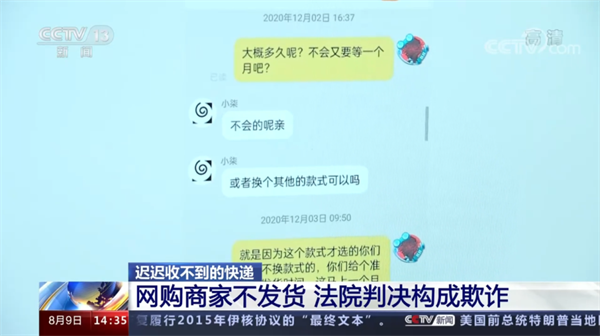Case summary

The plaintiff surnamed Li bought a set of furniture from an online shop for about 1,800 yuan ($265) one morning in 2020. He stayed up all night in order to get coupons and discounts so that the purchase was nearly 500 yuan cheaper than its normal price. The customer service staff promised to deliver the order by the end of November, but failed to do so. In their response to Li’s inquiry, they said something went wrong with the production line and they promised to deliver by the end of December, but failed again. This time they blamed the inspection of environmental protection for suspension of production and promised to deliver by the end of January, but broke the promise for a third time. The delivery delays lasted till April 1 when they notified Li that they were not producing that line of furniture any more. However, Li found out that the furniture was still on the shelf at another online platform. Li finally filed a complaint to the online platform against the store. Upon receiving the complaint, the store asked Li to pay the price difference before they would ship out the order.
Li was agitated by the request and sued the store at the Beijing Internet Court (BIC).
After trial, the BIC held that the store was obligated to make delivery once the sales contract was established. Without any evidence submitted by the store on the reasons for the delay, the BIC determined that the store had no justifiable reasons to delay the delivery and committed fraud. The BIC supported the plaintiff's request of compensation of three times the purchase price, and ruled that the store should continue to fulfill its delivery obligation and compensate Li with 5,480 yuan.
Tips from the judge:
During major sales promotions, online stores tend to give out big discounts or coupons to increase exposure and sales. However, they should consider their production and delivery capacities to make sure they can fulfill their contractual obligations. Payment of an online order means the establishment of a sales contract between the buyer and the store. Unless the contract is invalidated or canceled for statutory reasons, the store shall take corresponding liability for breach of contract if it fails to deliver.
If the store's behavior constitutes fraud, according to the Law on the Protection of Consumer Rights and Interests, the store shall increase compensation for the losses suffered by the consumer at the consumer's request. The amount of increased compensation shall be three times the price of the goods or service purchased by the consumer, with a minimum of 500 yuan.
For consumers, when purchases fail to deliver, they should first communicate with the store and record related evidence for potential disputes. Ways of evidence collection include screenshots of transaction information of the purchase, recording the complaining phones calls, and video-taping the package opening for expensive items. If communication with the store and the shopping platform is in vain, consumers can file a complaint at the local market supervision and administration authorities, or file a lawsuit in court after that.
This article is transferred from Beijing Internet Court, and I would like to thank you.